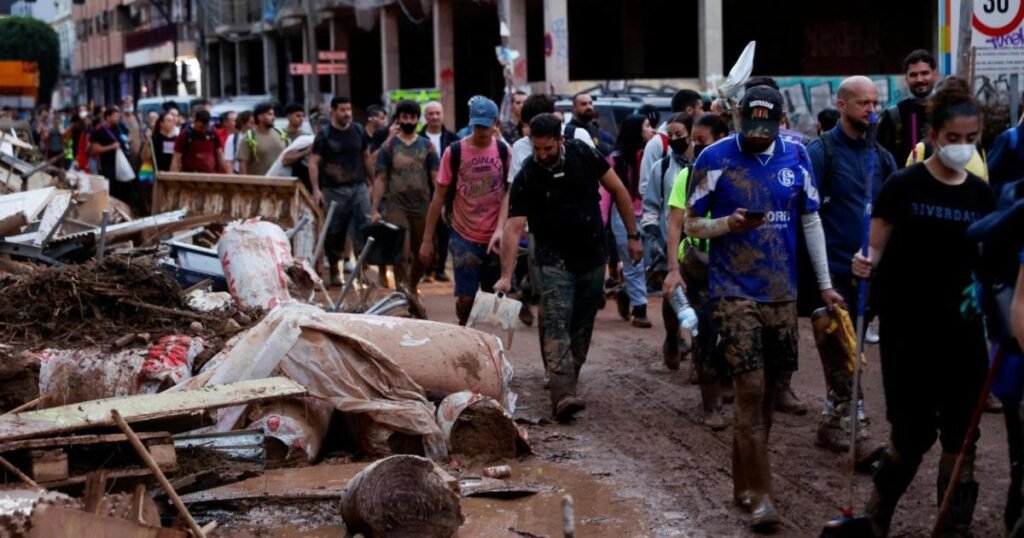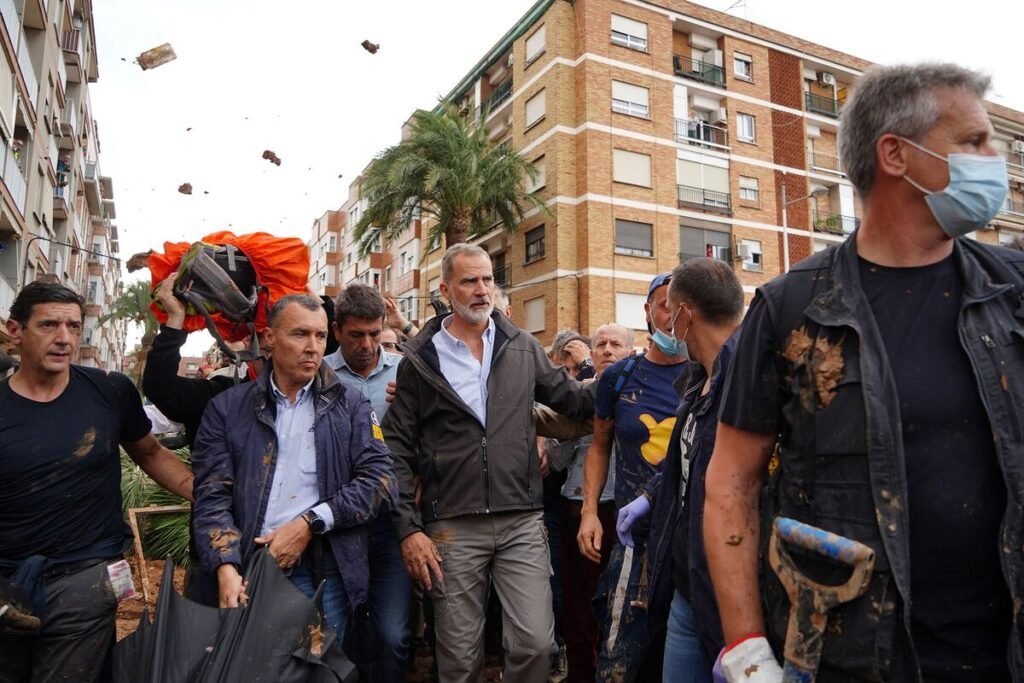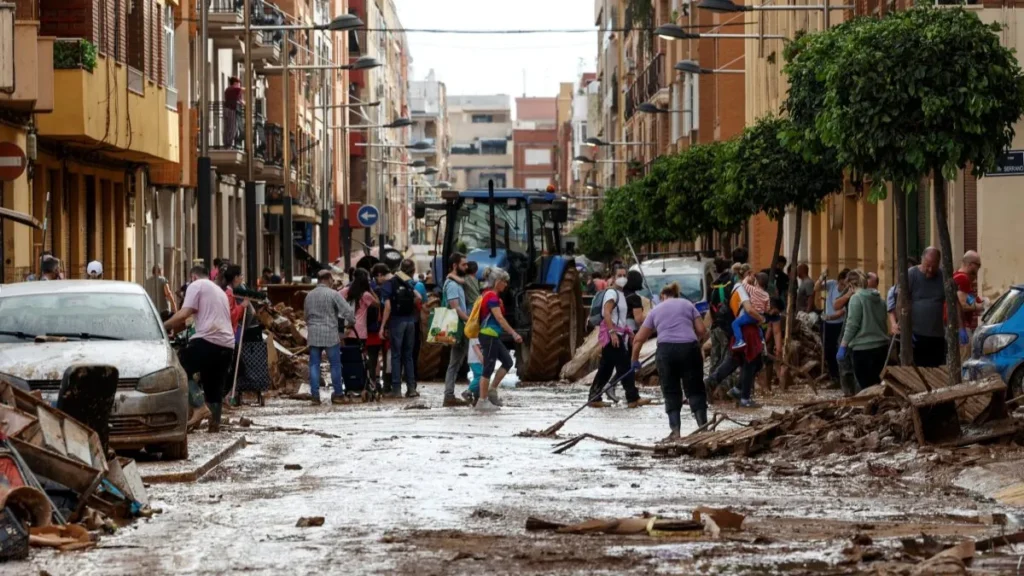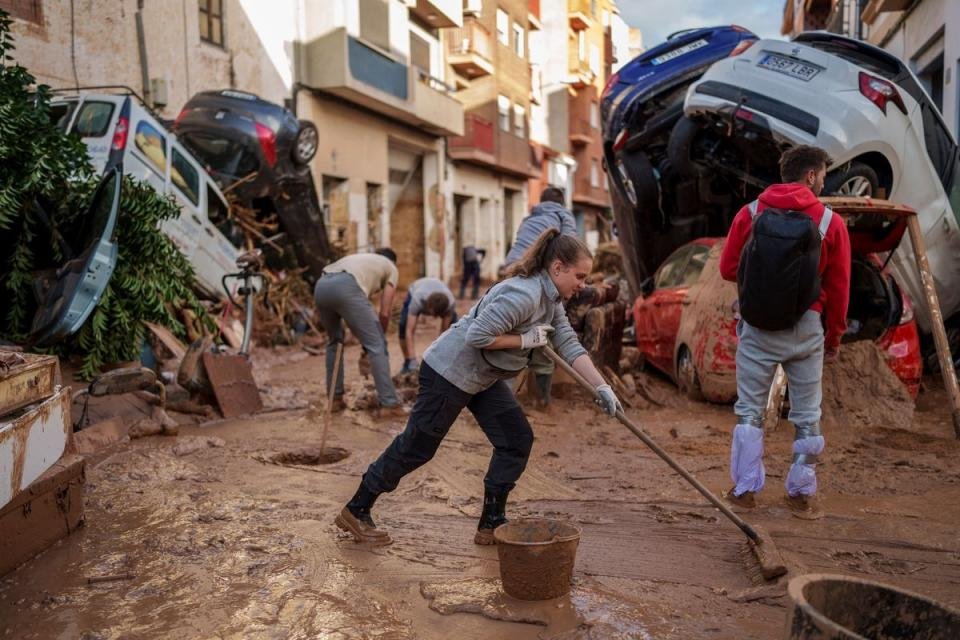Solidarity Amid Crisis: Lessons from Valencia’s Floods
The flash floods that ravaged the town of Paiporta, on Valencia’s outskirts, on October 29 left devastation in their wake but also revealed an extraordinary story of human solidarity. As residents faced the destruction of homes, businesses, and infrastructure, thousands of volunteers from across Spain arrived to provide immediate aid, offering essential supplies, clearing debris, and lending emotional support. This spontaneous display of mutual aid sharply contrasts with the perceived inadequacy of official institutional responses, which have drawn widespread criticism.
For residents like Palmira, a bakery owner, the volunteers were lifesavers. “We had no electricity or water. They came, emptied their backpacks full of food and flashlights, helped clear the mud, and returned every single day,” she recounted with gratitude. Her experience mirrors the efforts of individuals like Samuel, Paco, Alfonso, and Aitor, who drove ten hours from León to help however they could. This informal network of aid exemplified an organic system of community support, where everyone contributed, regardless of roles or recognition.
A Town in Crisis: The Aftermath of the Floods
Despite the valiant efforts of volunteers, Paiporta remains far from recovery. Streets may now be passable, but homes and businesses on ground floors are still buried in mud. Two weeks after the disaster, many residents remain in shock, and volunteers like Dani, a psychologist at a food distribution center, warn of long-term mental health repercussions, including post-traumatic stress, depression, and anxiety. The fading presence of volunteers as the crisis subsides threatens to leave affected communities feeling abandoned, heightening the need for sustained external support.


The Failure of Institutional Response
While volunteers worked tirelessly, public anger has grown over the perceived failure of government institutions. On November 4, during a visit to Paiporta by King Felipe VI, Queen Letizia, Prime Minister Pedro Sánchez, and Valencia’s regional president Carlos Mazón, frustration boiled over. Protesters greeted the officials with boos and even hurled mud, forcing Sánchez to leave under security concerns.
Critics argue that the conservative-led Valencian government, under Mazón, bears primary responsibility for the crisis. Despite being aware of the approaching storm’s catastrophic potential, authorities delayed public warnings until towns were already submerged. Offers of aid from other regions and the national government were reportedly declined, deepening the disaster’s impact.
Alberto Ibáñez, a legislator from the left-wing Compromís party, criticized the regional government’s handling, noting that it failed to issue timely alerts or effectively coordinate emergency efforts. Public perception of governmental failure has fostered a sense of disillusionment. As Jesús, a Paiporta resident, lamented, “Without the volunteers, we’d be much worse off.” Although Prime Minister Sánchez highlighted the deployment of over 18,000 personnel from the military, police, and emergency services, residents argue the response came too late to mitigate the disaster’s worst effects.

Mutual Aid: A Beacon of Hope
Amid institutional shortcomings, social solidarity has shone brightly. Photos of volunteers—armed with shovels and clad in raincoats—circulated widely on social media, alongside the slogan “Only the people save the people.” This movement mobilized donations of food and essential items from across Spain, distributed through networks like the Mutual Aid Network. Gonçal Bravo, a trade unionist and network organizer, credited existing grassroots connections with enabling swift and effective responses, turning mutual aid into a lifeline for affected communities.
The Far Right’s Opportunism
While grassroots activists and volunteers focused on recovery, far-right groups sought to exploit the disaster for political gain. Conspiracy theories proliferated, including baseless claims of a “meteorological attack” by Morocco, and false narratives aimed to deflect accountability from the regional government, in which Vox, the far-right party, held power until mid-2024. Far-right activists also organized selective aid distribution, often prioritizing Spaniards, and used social media to amplify their efforts.
Despite these attempts, residents like Laura Peris, an activist in Catarroja, observed that the far right’s outreach remained limited. Paiporta locals overwhelmingly described the volunteer response as apolitical and inclusive. “Here, there were no colors or parties—just people coming to help,” remarked a hardware store owner struggling to salvage her business. Bravo concurred, emphasizing that the far right’s presence was negligible compared to the broader solidarity efforts.

The long-term political implications of this disaster remain uncertain. While political analyst Quico Miralles suggests that the conservative Partido Popular may face repercussions, it is unclear whether Vox and other far-right actors will significantly benefit. The disaster’s legacy could either reinforce the values of mutual aid and collective action or become a stepping stone for opportunistic political agendas.
What is undeniable is the profound impact of grassroots solidarity in Paiporta’s recovery. This crisis has exposed the limitations of traditional institutions while showcasing the resilience and compassion of ordinary people. As Valencia rebuilds, its story serves as a reminder of the power of community and the need for accountable, responsive governance in times of crisis.

